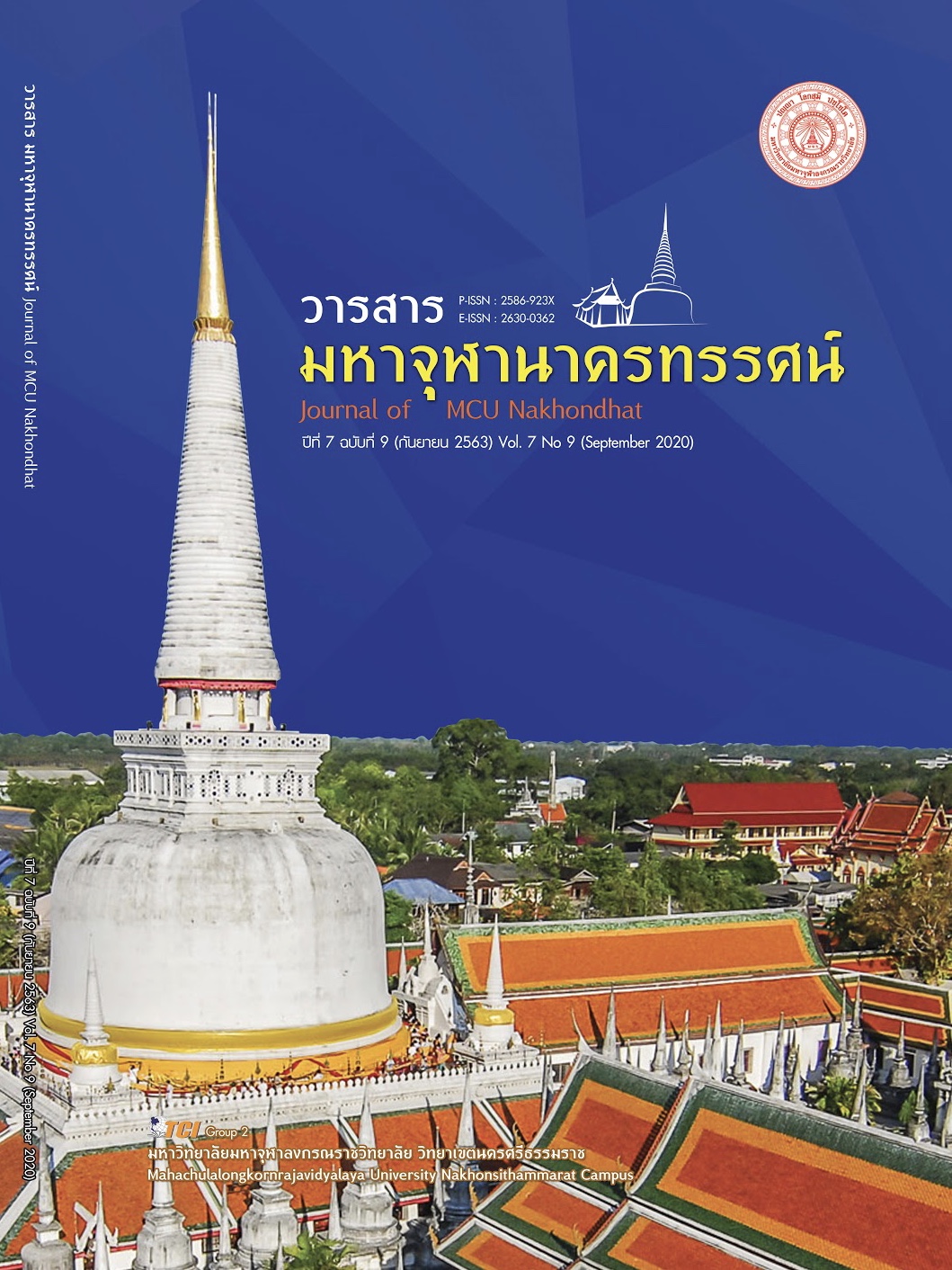THE DEVELOPMENT OF THE COMPETENCY IN COLLABORATIVE PROBLEM SOLVING BY USING LEARNING MANAGEMENT THROUGH DEEPER SCAFFOLDING FRAMEWORK OF MATHAYOMSUKSA 4 STUDENT
Main Article Content
Abstract
The action research was: To develop the collaborative problem solving competency Ability of student in grade 10th in order to pass the criteria of 70 percent of full score. The purposive sampling consisted of 20 grade 10th student who were studying in the second semester, academic year 2019, at Borabu school in Mahasarakham province. The methodology of this research was classroom action research consisting of 3 cycles. The research instruments were: 9 lesson plans of Deeper Scaffolding Framework, the collaborative problem solving competency observation form, the collaborative problem solving activity worksheet and the collaborative problem solving competency test. The research results indicated that the learning model process through Deeper Scaffolding Framework. Their collaborative problem solving competency increased significantly from first to third cycle of the classroom action. ability mean scores in the first, the second, and the third cycles were 54.46, 66.67, and 78.33 percent respectively. It obviously be seen that the students’ mean score passed the criteria in the third cycles. Because situations related to student's experience help to encourages the student to be interested in learning, defind and understand the problem leading to discuss and solve the problem together including assign roles and teamwork. It helps students to develop appropriate collaborative problem solving competency. So, Deeper Scaffolding Framework can help develop students collaborative problem - solving competency.
Article Details
References
ทิศนา แขมมณี. (2557). ศาสตร์การสอน: องค์ความรู้เพื่อการจัดกระบวนการเรียนรู้ที่มีประสิทธิภาพ. (พิมพ์ครั้งที่ 18). กรุงเทพมหานคร: ด่านสุทธาการพิมพ์.
ปาริชาต ผาสุข. (2560). วิจัยปฏิบัติการเพื่อพัฒนาสมรรถนะการแก้ปัญหาแบบร่วมมือด้วยการจัดการเรียนรู้ ตามกรอบการเสริมต่อการเรียนรู้แบบ DEEPER เรื่อง ระบบย่อยอาหาร ของนักเรียนชั้นมัธยมศึกษาปีที่ 4. วารสารวิชาการและวิจัยสังคมศาสตร์, 12(34), 127-140.
วรางคณา ทองนพคุณ. (2554). ทักษะเพื่อการดำรงชีวิตในศตวรรษที่ 21 คืออะไรมีความสำคัญอย่างไรในทักษะแห่งศตวรรษที่ 21 ความท้าทายในอนาคต (21st century skills: the challenges ahead). ภูเก็ต: คณะครุศาสตร์มหาวิทยาลัยราชภัฏภูเก็ต.
วิจารณ์ พานิช. (2557). การเรียนรู้เกิดขึ้นอย่างไร. (พิมพ์ครั้งที่ 2). กรุงเทพมหานคร: มูลนิธิสยามกัมมาจล.
ศิริวรรณ ฉัตรมณีรุ่งเจริญ และวรางคณา ทองนพคุณ. (2557). ทักษะแห่งศตวรรษที่ 21 ความท้าทายในอนาคต 21st century skills: the challenges ahead. ภูเก็ต: คณะครุศาสตร์มหาวิทยาลัยราชภัฏภูเก็ต.
สถาบันส่งเสริมการสอนวิทยาศาสตร์และเทคโนโลยี. (2557). ผลการประเมิน PISA 2012 คณิตศาสตร์ การอ่านและวิทยาศาสตร์นักเรียนรู้อะไรและทำอะไรได้บ้าง. กรุงเทพมหานคร: อรุณการพิมพ์.
สถาบันส่งเสริมการสอนวิทยาศาสตร์และเทคโนโลยี. (2560). สรุปข้อมูลเบื้องต้น. กรุงเทพมหานคร: อรุณการพิมพ์.
สำนักเลขาธิการสภาการศึกษา. (2552). ข้อเสนอการปฏิรูปการศึกษาในทศวรรษที่สอง. กรุงเทพมหานคร: พริกหวานกราฟฟิคจำกัด.
. (2550). แนวทางจัดการเรียนรู้ที่เน้นผู้เรียนเป็นสำคัญ: การจัดการเรียนรู้โดยใช้ปัญหาเป็นฐาน. กรุงเทพมหานคร: โรงพิมพ์ชุมนุมสหกรณ์การเกษตรแห่งประเทศไทยจำกัด.
สำนักงานคณะกรรมการพัฒนาการเศรษฐกิจและสังคมแห่งชาติ. (2558). ทิศทางแผนพัฒนาเศรษฐกิจและสังคมแห่งชาติฉบับที่ 12 (พ.ศ. 2560 - 2564). กรุงเทพมหานคร: สำนักงานคณะกรรมการพัฒนาการเศรษฐกิจและสังคมแห่งชาติ.
สุนีย์ คล้ายนิล และคณะ. (2549). สมรรถนะการแก้ปัญหาสำหรับโลกวันพรุ่งนี้. กรุงเทพมหานคร: เซเว่นพริ้นติ้ง กรุ๊ป.
Antonenko, P. P. (2014). Fostering collaborative problem solving and 21st century skills using the DEEPER scaffolding framework. Research and Teaching, 43(6), 79-88.
Antonenko, P. P. et al. (2011). DEEPER e-learning with Environment for collaborative learning integrating problem solving experiences (ECLIPSE). Proceedings of World Conference on E-Learning in Corporate, Government, Healthcare, and Higher Education, 1(1), 1811-1816.
Care, E. & Griffin, P. (2014). An approach to assessment of collaborative problem solving. Research and Practice in Technology Enhanced Learning, 9(3), 367-388.
Hilton, M. (Rapporteur). (2010). Exploring the intersection of science education and 21st Century skills: A workshop Summary. National research council. Retrieved January 25, 2019, from http://www.http://k12accountability .org/resources/STEMEducation/Intersection_of_Science_and_21st_C_Skills.pdf


